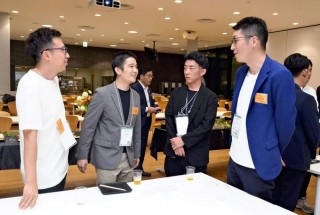Loading
Search
▼ Firms Make ‘Alumni’ Networks to Boost Businesses; Experts Say Move Important Amid Growing Workforce Mobility
- Category:Other
There is a growing movement among companies to establish “alumni networks,” where former employees can interact with their former employers. The companies are aiming to improve their operations and create new businesses by leveraging the expertise of “outside” people who are familiar with the company culture.
NTT West, Inc. officially launched its alumni network in April, and about 80 people have been interacting via a website. In mid-June, the company held its first in-person networking event at the company headquarters in Miyakojima Ward, Osaka, where former employees gathered and drank beer.
“There’s a ‘common language’ that only people who have worked at the same company can understand, which makes it easier to build relationships,” said Tetsuya Yamamoto, 57, who quit NTT West last year and now works at a consulting firm in Tokyo. “I hope to collaborate with my former company as a business partner to create new opportunities.”
NTT West is considering holding regular networking events in the future.
“We hope to connect with former employees and create new value,” a spokesperson said.
With labor shortages becoming severe, a growing trend had emerged in which former employees were rehired so that their contributions could be utilized. Recently, however, there has been a noticeable shift toward maintaining only loose connections with former employees without rehiring them.
Honda Motor Co. announced in October that it had established an alumni network. The aim of the network is not only to secure talent in the IT and software fields but also to improve the company’s work environment with the expertise of former employees who have worked at other companies.
“We want to leverage knowledge gained at other companies to drive our company’s growth,” a spokesperson said.
An increasing number of companies are creating networks, particularly major companies such as Toyota Motor Corp. and Panasonic Holdings Corp.
“Human capital management, which sees personnel as part of a company’s capital, is becoming increasingly important, and retirees are also being considered as capital,” said Hitoshi Suzuki, CEO of Hackazouk in Tokyo, which develops alumni exchange systems.
However, the utilization of alumni remains limited in practice. According to a survey conducted in November by the specialized magazine “Gekkan Somu” (Monthly General Affairs), only 10.3% of companies have alumni networks. Reasons cited for not having them include “high operational and labor costs” and “no interest in utilizing retired talent.”
“As workforce mobility increases, it is crucial for companies to maintain connections with former employees,” said Kaoru Tsuda, head of the research center at Indeed Recruit Partners Co., which specializes in talent development.
“When it comes to leveraging alumni, it is essential to consider why you want to use them and to align that purpose with your business strategy.”
- July 14, 2025
- Comment (0)
- Trackback(0)


